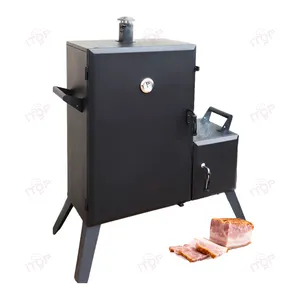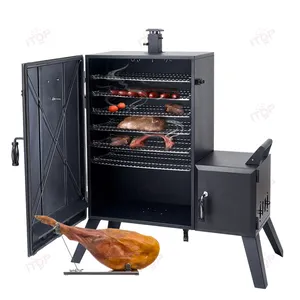
All categories
Featured selections
Trade Assurance
Buyer Central
Help Center
Get the app
Become a supplier

(2081 products available)






Meat smoker for sale refers to apparatuses used to impart a specific flavor by cooking meat over low heat and smoke. With various flavors of wood available, many meats can be smoked. Smokers are generally classified into two broad categories based on heat, and among them are electric meat smokers for sale. These run on electricity and have an electric heating element to create smoke from wood. They are generally easier to use than other smokers. Users only need to load wood and control the temperature. They are great for beginners.
Gas smokers for sale use propane or natural gas as fuel. The propane or natural gas element creates smoke when it is ignited. Gas smokers are known for their ability to quickly reach and maintain ideal smoking temperatures. They offer users complete control over their smoking session. Gas smokers provide consistent heat and easily adjust the flame for precise temperature management. This allows them to achieve remarkably smoky and tender meats without much hassle. Aside from electric and gas smokers, there are vertical smokers for sale. They are characterized by a vertical smoking chamber. This vertical arrangement allows for efficient heat and smoke circulation, rising through the meat from below. The meat is usually placed on multiple racks.
The offset smoker for sale is a horizontal smoker. It is referred to as offset because the firebox is located on the side and not directly below the smokebox. Many barbecue enthusiasts love offset smokers because they achieve high temperatures ideal for smoking. They provide a traditional smoking experience, allowing users to control the temperature by adjusting the air intake and output. Pellet smokers for sale use compressed sawdust pellets as fuel. The pellets are loaded into a hopper, where a sensor controls the feeding system to maintain the desired temperature. A digital controller then regulates the temperature and smoke level. With their automatic feeding systems and digital temperature control, pellet smokers combine the traditional art of smoking meat with modern technology for straightforward yet satisfying results.
Features of Smokehouse Meat Smokers
The specifications for meat smokers for sale vary from one product to another because there are different types, models, brands, and designs. So, generally, the dimensions of meat smokers will depend on the type. For example, an electric meat smoker dimensions will be around 24 x 18 x 36 inches with a weight of approximately 90 pounds. A portable meat smoker, on the other hand, will have dimensions closer to 16 x 16 x 14 inches and a weight of about 30 pounds.
When it comes to capacity, a small meat smoker can take up to 20 pounds of meat. Larger and more industrial-scale smokers can take up to 1500 pounds of meat, depending on the design, model, and type. Pneumatic smokers tend to be very large, and their capacity can range anywhere between 800 to 10,000 pounds of meat.
Apart from these specifications, there are certain things about the performance of a meat smoker that business owners would want to know. A great feature of a meat smoker is the ability to achieve low and slow smoking. Generally, the smoker achieves a temperature range of about 225 to 250 degrees Fahrenheit. Additionally, some smokers have a humidity control feature that allows the meat to retain moisture while smoking. This generally results in flavorful and tender meat products. The average time it takes to smoke brisket in a meat smoker is about 10 to 14 hours, while ribs take approximately 4 to 6 hours.
Meat smokers require proper maintenance and cleaning to continue functioning optimally over the years. Begin by removing any ash or residue from the smokers using the appropriate tools. Deep cleaning the smoker from time to time, at least once every couple of months, is also very important. This involves cleaning grates, grease trays, and fireboxes. Follow the manufacturer's instructions and use appropriate cleaning solutions. Regularly inspect the smoker doors to see if there are any leaks, warped areas, or damaged parts that need repairs. Ensure there are no leaks around the doors that could let out heat. Also, ensure that all the hinges, latches, and seals are in good condition. If there are any leaks, use high-temperature silicone to seal them up and avoid air leaks. Finally, conduct seasonal maintenance whenever the meat smoker is not being used. This could be during the cold months. Run a hot burn to remove any grease buildups, and use a wire brush to clean the grill racks and firebox.
Meat smokers are invaluable assets to many professional kitchens. This includes restaurants that specialize barbecue or smoked cuisine. Also, meat smokers are standard equipment in catering businesses. They provide various meats for outdoor events like weddings, corporate gatherings, and parties. Additionally, meat smokers are used in butcher shops and delis. Besides, offering smoked meats alongside regular fresh produce helps capture a larger market share. Meat smokers are also used in flavoring workshops. Many artisans experiment with different smoked products, such as cheeses, nuts, vegetables, and cocktails.
Barbecue joints are the most obvious but also popular application of meat smokers. Many independent and franchise smokers, as well as barbecue joints, heavily depend on meat smokers for their business. Meat smokers are essential tools for creating authentic barbecue flavors that customers have come to know and expect.
Meat smokers also come in handy for different game and fish preservation techniques. Hunters and anglers often rely on meat smokers to preserve their seasonal catches, ensuring they don't go to waste. Smoked fish and game meat are excellent delicacy options that provide an alternative income stream when the primary hunting or fishing season is closed.
Large-scale meat smokers are often used in the food processing industry. They are integral machines in factories that produce smoked meat products like hotdogs, sausages, bacon, and jerky. Such industries rely on meat smokers to enhance the flavor of their products and improve shelf life through smoking and cooking simultaneously.
Wholesale buyers looking to buy smokers for sale should start by looking at the overall quality of the smoker. They should look for durable materials, such as stainless steel construction, which will provide better resistance to rust and damage over time. Good quality meat smokers will provide uniform heat and dependable operation.
Supply buyers should consider the design and build of the meat smoker to ensure it is easy to use, control, and clean. Features like removable ash pan, grease tray, and smoke chamber with a cleaning door all help to simplify the cleaning process. Meat smokers with large cooking space are perfect for handling multiple meats at once, and additional cooking racks provide flexibility to adjust the space according to needs. Smokers with side racks are helpful for holding cooking supplies. A shelving unit or cart can also assist in storing supplies when not in use.
When purchasing smokers in bulk, buyers should consider whether the smoker requires electricity, gas, charcoal, or wood. They should also assess the level of smoker maintenance required. Generally, electric smokers require very little maintenance, while charcoal smokers require regular ash disposal and recharging with charcoal or wood.
Wholesale buyers should choose the smoker that suits their target customers' needs and preferences. For instance, business owners looking to buy smokers for barbecue joints should go for meat smokers with grill features. Customers looking for simplicity will most likely choose an electric smoker over a charcoal or propane smoker. Consideration of customer needs will ensure repeat purchases.
When buying smokers for resale, buyers should consider the smoker's temperature control features. Adjustable dampers, thermostat gauges, and insulated fireboxes allow the smoker to maintain a consistent cooking temperature and control the airflow. Auto-temperature control features allow automatic adjustments of the smoke generated and heat maintained.
Q: How long can users smoke meat?
A: Users can smoke meat for as long as they like, depending on the type of meat and the flavor they are going for. For example, a smoking time of 12 to 24 hours is typically enough for large cuts like brisket, pork shoulder, and whole turkey. Smaller cuts like chicken quarters and ribs will take 6 to 8 hours.
Q: What kinds of wood give meat smokers the best flavor?
A: Users usually pick wood based on the flavor they want. For example, fruit wood like apple, cherry, and peach will impart a mildly sweet flavor. Strong woods like hickory and mesquite give a more robust flavor, but they can easily overpower the meat.
Q: Can users smoke meat if they don’t have a meat smoker?
A: Yes, users can smoke meat without a smoker by using a charcoal grill or their kitchen stovetop. However, the meat may not have as much flavor as it would if it were smoked in a proper smoker.
Q: What is the difference between a smoker and a grill?
A: Meat smokers are designed for low and slow cooking, while grills are ideal for high-temperature cooking. Moreover, meat smokers tend to give meat a distinct smoky flavor, which some people love, while grills don't.